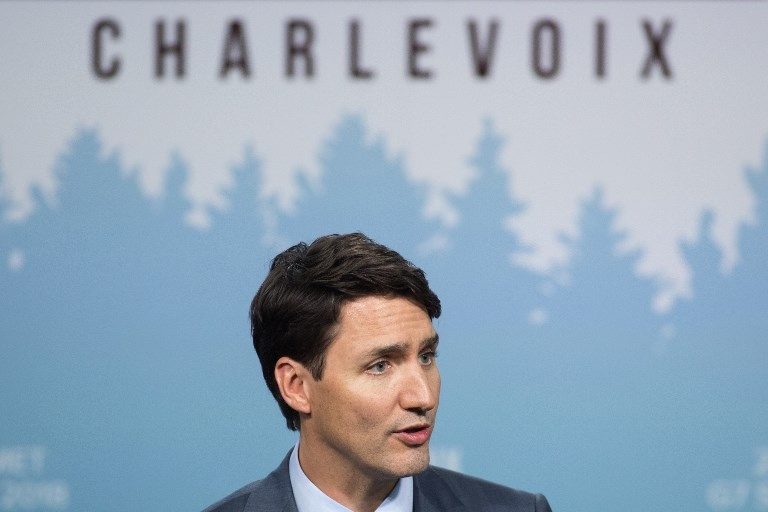SUMMARY
This is AI generated summarization, which may have errors. For context, always refer to the full article.

WASHINGTON DC, USA – There is still a way to go to reach a new North American Free Trade Agreement, Canada’s prime minister said Wednesday, September 19, brushing off US pressure for a quick deal as high-level talks resumed in Washington.
Canada’s top diplomat Chrystia Freeland met twice with US Trade Representative Robert Lighthizer in Washington on Wednesday, and called some of the issues involved “fiendishly complex.”
Negotiators have been in talks nearly non-stop for a month as they try to overcome hurdles and agree on a NAFTA rewrite.
The goal is “to see if we can get a good deal for Canada, a good deal for everyone,” said Prime Minister Justin Trudeau.
“We remain confident that there is always a deal possible, but it will take more work.”
US President Donald Trump, who called NAFTA “one of the worst trade deals in history,” spoke to Trudeau late Tuesday by telephone, and “the two leaders discussed trade,” White House press secretary Sarah Sanders said in a statement.
Trump demanded the 1994 accord between Canada, the United States and Mexico be revised, and the talks started a year ago. Trump has blamed the trade pact for sending many manufacturing jobs – notably in the auto sector – to Mexico.
As the sides continue work towards a rewrite of the 25-year-old pact, Freeland told reporters on Wednesday they already have tackled “a fiendishly complex set of issues and economically absolutely core to the North American economic relationship.”
Now officials are working on the remaining disagreements, centering on Canada’s managed dairy sector, and the dispute resolution provisions.
However, Freeland declined to discuss specifics on the status of the talks or whether any progress had been made in overcoming those differences.
“Our negotiators have been really hard at it including an all-night session last night of one team. So we are working very, very hard,” she said earlier in the day.
In between meetings with US trade officials, Freeland huddled at the Canadian Embassy with Ontario Premier Doug Ford, the Conservative leader of the province home to much of Canada’s automotive industry.
The United States and Mexico sealed their own two-way deal at the end of August, after reaching agreement on auto content requirements. They plan to sign the accord by December 1, and since then Trump has ramped up pressure on Canada to accept his terms.
But Ottawa has seemed reluctant to give in to Trump’s push to agree to a deal before US midterm elections in November, and the transfer of power December 1 to Mexican President-elect Andres Manuel Lopez Obrador.
Trudeau’s Liberals also need a win to hold up to voters when they return to the polls in one year.
Dairy farmers on edge
Ottawa and Washington remain at odds over Canada’s protected dairy sector and cultural subsidies, as well as Canada’s demand for an international system for resolving disputes.
Dairy farmers publicly urged Trudeau not to cave to demands for increased access to the nation’s dairy market, noting that the US already sells five times more milk to Canada than Canada sells to the US.
“We call on the government to ensure that any final NAFTA deal has no further negative impact on our dairy sector,” Pierre Lampron, the president of the Dairy Farmers of Canada, said at a news conference.
Flanked by dairy farmers from all of Canada’s 10 provinces, he said Ottawa had given milk and cheese carve-outs to the EU and 10 member nations in the Trans-Pacific Partnership trade pact in order to secure free trade with those blocs.
This cost Canada Can$250 million (US$193 million) in lost milk production, he said. The Canadian industry is valued at Can$19 billion.
That also hurts associated industries, Lampron said. “Enough is enough.”
The government controls production and prices of milk, eggs and poultry, resulting in higher prices for consumers but a stable income for farmers.
“We will continue to defend supply management,” Trudeau said. “This is a system that works for Canadians. It works for our agricultural industry.” – Rappler.com
Add a comment
How does this make you feel?














There are no comments yet. Add your comment to start the conversation.